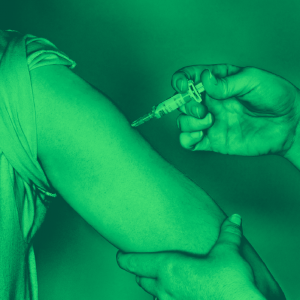Tech & Science dictionary
vaccine hesitancy
[ vak-seen hez-i-tuhn-see ]
Vaccine hesitancy is unwillingness or refusal to accept a vaccine even when one is available.
Vaccine hesitancy is a general term that is used to refer both to people hesitant to take some specific vaccines as well as the so-called “antivaxxers” who refuse to take any vaccines at all. The media sometimes uses the term vaccine skepticism interchangeably with vaccine hesitancy.
Although the term vaccine hesitancy has been used in the medical field since around the late 2000s and early 2010s, it saw mainstream use during 2020 and 2021 when vaccine hesitancy toward the COVID-19 became a significant issue.
Where does vaccine hesitancy come from?

The definition of vaccine hesitancy that is most commonly used amongst scientists and health experts comes from a 2015 report from the Strategic Advisory Group of Experts on Immunization (SAGE). SAGE is a group of scientists that conducts research on behalf of the World Health Organization (WHO) and advises the WHO on strategy and technology. SAGE began officially researching vaccine hesitancy in 2012. SAGE actually considered other terms to use before settling on vaccine hesitancy.
According to the report, “vaccine hesitancy refers to delay in acceptance or refusal of vaccination despite availability of vaccination services.” Interestingly, the report indirectly acknowledges the existence of “antivaxxers” but places a much larger focus on the people located on the spectrum between total acceptance and total refusal of vaccines.
The report attributes the cause of vaccine hesitancy to three major factors: complacency, confidence, and convenience.
- Complacency refers to the belief that taking a vaccine is unnecessary because the risk or dangers of disease is thought to be low.
- Confidence refers to people’s trust in the vaccines themselves as well as the trust (or lack thereof) of the health professionals and government distributing the vaccine.
- Convenience refers to availability of the vaccine. A person may be unwilling to get a vaccine because it is too expensive or because the distribution center is physically too far away.
In 2019, the WHO listed vaccine hesitancy as one of their 10 biggest threats to world health. While the WHO and other medical researchers might indirectly acknowledge antivaxxers, they are often considered to be a small part of the larger group that includes all vaccine-hesitant people. Experts are more concerned with the people “on the fence” about vaccines as they are much more likely to be convinced of the numerous benefits of vaccines.
In 2020 and 2021, vaccine hesitancy became a major problem during distribution of vaccines against the COVID-19 virus. In the United States, vaccine hesitancy was seemingly politically motivated with Republicans much less willing to take a COVID-19 vaccine. Vaccine hesitancy was also common in the Black community, who have long been distrustful of a health system that has been affected by systemic racism. Vaccine hesitancy was also prevalent in minority groups in other countries for similar reasons.
Examples of vaccine hesitancy
Who uses vaccine hesitancy?
At one time, vaccine hesitancy was mostly used by health experts and medical professionals. Since the COVID-19 pandemic, however, the term vaccine hesitancy has become widespread due to extensive use in the media.
Vaccine hesitancy within the Black community is not about ‘cultural differences’ but rather historical and institutional racism.
Trust is earned not given.
Our vaccine campaigns need to reflect this reality.
— Ahmed Ali (@MrAhmednurAli) February 20, 2021
In Israel, vaccine hesitancy persists even in some surprising places, including medical staff at some hospitals. https://t.co/zJQGq4lZ2R
— Foreign Policy (@ForeignPolicy) February 19, 2021
doing my part to fight vaccine hesitancy by bringing up my covid shots in every bit of small talk I can find
— The Masked Maine Millennial (@MaineMillennial) February 14, 2021
Note
This is not meant to be a formal definition of vaccine hesitancy like most terms we define on Dictionary.com, but is rather an informal word summary that hopefully touches upon the key aspects of the meaning and usage of vaccine hesitancy that will help our users expand their word mastery.